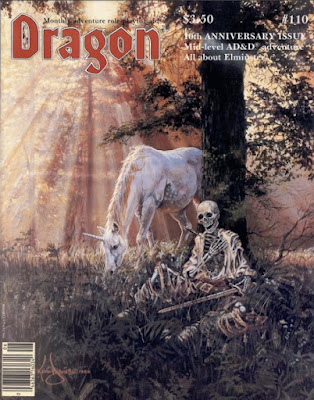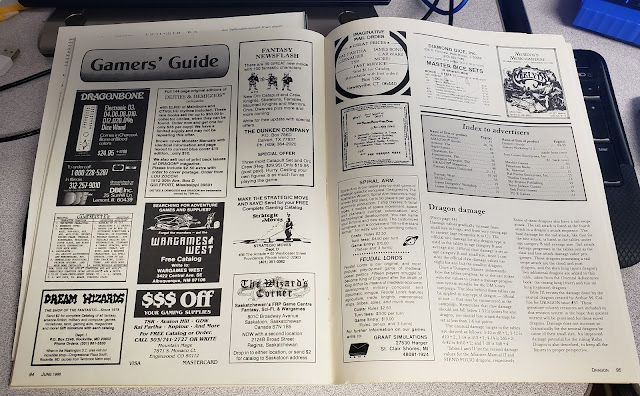It is June 1986 and what came to be known as the Dragon Wars had begun in my campaign world. My regular DM had graduated and was preparing to go off to the Air Force. I was concentrating on getting in as many math and science classes as I could prior to going off to college. It was an interesting time.
I remember sitting down in the Pavilion at Nichols Park in my hometown reading over this issue. It seemed to be filled with great things. I am happy to report that my memory lives up to reality.
Before we get into the magazine proper let's take a moment to marvel at this cover by Kevin Davies, The Vanquished Cavalier. Likely one of the top 10 covers in my opinion. And it is art you can buy for your own projects.
Kim Mohan discusses the 10th Anniversary of Dragon Magazine here, noting that there will be less hoopla now than in Issue #100. Future anniversaries will have a bit more "pomp."
Letters cover the topics of the day, namely more revisions of the Ranger. Seriously has anyone EVER been happy with the Ranger?? One letter asks if the Electronic Eye is ever coming back and we told that yes, a computer-based column is back in this issue. I was quite pleased with this. I had just bought a new computer, a Color Computer 3 but they never covered games for it. Backed the wrong horse that time, but I can't complain. Like the Old-School Revival for D&D there is an Old-School Revival (of sorts) for old computers.
The Forum covers the lament of the time, this too much Greyhawk in the pages of Dragon and the Unearthed Arcana. I remember all of this. Oh to have those problems now.
Our first article is from Ed Greenwood and it is a classic in my mind. The Cult of the Dragon not only introduces the titular cult, it also introduces us to the Dracolich. Re-reading it now I find it interesting that the genesis of this article comes from Dragonlance. Well, the Realms Boxed set won't be released for a little yet. The article was an early favorite of mine and I spent a lot of time comparing this article to the classic Blueprint for a Lich from Best of Dragon Vol. II. I really respected what Ed was doing here. Rereading it now I am still marveling at how good it still is. I might need to incorporate this into my games somehow. The cult migrated from Krynn to Toril and then to the rest of the multiverse. This is of course the best thing to use in a Dragon article; finding something and making it work for your game.
Up next are two articles that would make up a One Man's God: Norse Mythos, Part II. The two articles came to the Dragon offices at the same time so they decided to run them both.
The first is For Better or Norse: I Equal time for the members of the Vanir by Joel McGraw. This one covers the Vanir gods. Of personal interest, we get Angur-boda, Grid, and Gullveig are all described variously as witches. There are also stats for Njord, Mimir, Nidhogg, and Utgard-Loki the "star" of the first Norse myth I ever read. Honestly, these should be glued into my D&DG. Again none of these would really be considered AD&D demons.
Next is For Better or Norse: II New Descriptions of Some Old Favorites by Carl Sargent. This one gives us some updates to the Norse gods found in the D&DG. Featured are Niord (spelled differently this time), Frey, Freya, and Loki. Loki gets the biggest change, going from Chaotic Evil to Chaotic Neutral. I felt at the time this was a good change. I still do, but now I have a greater appreciation of the myths and the character. Again, I wish I could paste this one into my D&DG.
An ad for one of my favorite Near-D&D products of all time, the Arcanum.
Another Ed Greenwood article is next and it is one only Ed can do; All about Elminster. I went from being mildly annoyed by Elminster (here) to outright dislike, to rabid dislike (2nd Ed), to acceptance (3rd ed) and even a begrudging like (now). The article is actually rather fun. Elminster is a 26th level magic-user. The article also includes some new spells which is expected. I am not sure how these compare to his 3rd Edition stats. Since my issue is falling apart anyway this will go into my Forgotten Realms boxed set.
The Role of Computers is up for it's debut. Examples are given for the Macintosh computer, arguably the most advanced machine at the time.
Leonard Carpenter is up with Dragon Damage Revisited. This revises the damage done by dragons from the Fiend Folio, Monster Manual II, and the gemstone dragons. This very conversation came up the other day online in talking about 1st Ed dragons. You can see how across the editions they made dragons more and more powerful. These numbers look pretty good, I'll have to dig up the first in the series and see what their logic is.
Our centerpiece adventure is The House in the Frozen Lands by James Adams. I always thought this was more tied directly to the Norse myths, but I think that was only my memory. The adventure is for 6-10 characters of 4th to 8th level. If nothing else there are some good ideas of the types of encounters one can find in an arctic environment. The adventure always looked interesting to me since it didn't feel like a dungeon crawl.
TSR Previews lets us know what is coming out in July and August of 1986. I remember buying REF2 Character Sheets and then taking them to college where I ran off 100s of copies at Kinkos on different colored sheets. In fact, I still have some. Those sheets outlived both TSR and Kinkos. I had never heard of some of the board games here, but I did find listings for The BROADWAY Game and The HONEYMOONERS Game. Nothing though in my quick search for The PARAMOUNT Game.
The fiction section is The Wizard's Boy by Nancy Varian Berberick. I didn't read it, but Berberick went on to write more novels and short stories including a few Dragonlance ones for Wizards.
Moving on to the Arēs section.
Knowledge is Power by John M. Maxstadt gives us a skill system for Gamma World. This looks like it is for 2nd Edition GW, but I will admit I am not knowledgeable on the differences between 2nd and 3rd.
There is a bit on underwater action in Star Frontiers from William Tracy in Going for a Swim. I am pretty sure that I never had characters go underwater ever in SF. Space yes, sea no. BUT that all being said there are some good ideas here that are useful to most games. This includes getting "the bends" and movement and other hazards. The article really does read like a 20th-century point of view rather than a futuristic one. I would assume that a culture capable of FTL flight had worked some of these other issues out as well.
Piece of the Action details organized crime in Paranoia. This is another one of those articles that would later get Wizards of the Coast into trouble with the Dragon CD-ROM. It is copyrighted 1986 by the author Ken Tovar.
Gamers' Guide gives us our small ads. I love looking at this even if I know most, if not all, these places have long since closed up shop.
One thing though. Lou Zocchi's ad mentions he is selling the original Deities & Demigods with Cthulhu and Elric. No shock there, but there is also a mention of the BROWN cover Monster Manuals that are the same of the current Blue cover. What is he talking about here? Does he mean the original 1977 cover versus the orange spine? That is the only thing I can think of to be honest.
Convention Calendar gives us the happenings of Summer 1986. None were close to me.
Dragonsmirth, Snarf Quest, and Wormy follow.
Gamers of a certain will go on and on about how great Dragon was in the early 80s. And to a large part I agree, it was great. But the late 80s and even into the 90s Dragon was great as well, for different reasons. The first 10 years of Dragon captured the hobby in its early days and its DIY attitude, which one of the big reasons people loved it AND the same attitude that drove the early days of the OSR. Dragon entering its second decade was a more polished magazine and the article quality had improved. DIY was still there, but not the gritty DIY of the 1970s and early 80s. Still, I find a lot in these pages, 1986 to 1996, that I find very useful and more to the point, things I would still use today.






Re: the TSR board game announcement, both Terrible Swift Sword and Barbarossa were reprint editions of 1970s era games from SPI, which TSR had gotten the rights to after putting them out of business by unexpectedly calling in a loan they'd made them.
ReplyDeleteNever heard of the Paramount game, though.
Well, no, the Cult of the Dragon didn't come from Dragonlance, nor was it inspired by Dragonlance. The Cult is about ten years older than Dragonlance.
ReplyDeleteWhat I did in the first few lines of the Cult article was deal with a problem communicated to us in letters to the editor by DMs at the time: the difficulty of putting the Dragonlance dragons into an existing campaign as villains without bringing in the whole huge war and really changing the character of a campaign was a result.